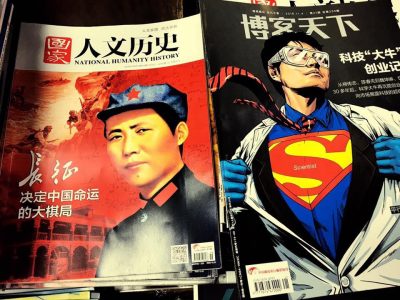
Gazetiboky sinoa eny amin'ny kioska any Beijing. Saripikan'i Filip Noubel, nahazoana alalana.
Hatramin'ny nametrahan'i Xi Jinping ny tenany ho mpitondra tsy azo iadian-kevitra ao Shina tamin'ny taona 2013, nanjary iray amin'ireo laharam-pahamehan'ny governemanta shinoa ny andraikitry ny haino aman-jery manerantany amin'ny famerenana indray ny endrik'i Shina. Ankehitriny dia nahavita nahasarika mpanao gazety sy fampahalalam-baovao maro manerana izao tontolo izao izay matetika mazoto noho ny fandrisihana ara-bola sy/na fiarahamientana ara-potokevitra ny ezaka nataon'i Beijing. Vokatr'izany dia nanaiky ny hanivana votoaty mitsikera ny governemanta shinoa izy ireo ary hampiroborobo ny hetsika manerantany ataon'i Beijing toy ny tetikasa One Belt, One Road. Nivoaka vao haingana ny porofo farany raha namoaka momba ny haben'ny fanivanana ataon'i Shina amin'ny fampitam-baovao, ny governemanta sy ny tontolon'ny ara-kolontsaina any amin'ny firenena maro ny mpiasa shinoa iray nifindra tany Aostralia.
Fikambanana iraisam-pirenena maro isan-karazany no manara-maso akaiky ny fitaomana Shinoa amin'ny alàlan'ny fampahalalam-baovao ankehitriny, tahaka ny Sinopsis miorina any Prague, na ny Reporters Sans Frontières (RSF) any Paris izay namoaka tatitra antsoina hoe China’s Pursuit of a New Media World Order (Manenjika Lamina Vaovao amin'ny Fampitam-Baovao i Shina) tamin'ny volana Martsa 2019 izay mamaritra ny ezaka ataon'i Beijing amin'izany.
Niresaka tamin'i Cédric Alviani, talen'ny biraon'ny RSF Azia Atsinanana sy Tapei aho mba hanoritra an-tsarintany ny haben'ny taratra shinoa, ary hamaritra hoe hatraiza ny fahafantaran'ireo matihanina amin'ny fampitam-baovao sy ny hevi-bahoaka momba izany zava-misy izany.
Filip Noubel: Tamin'ny tatitra nataony, dia nasongadin'ny RSF ny fiandohan'ny fitakian'i Beijing lamina vaovao manerantany momba ny fampitam-baovao amin'ny tsirinkevitra relativisma ara-kolontsaina. Azonao azavaina ve?
Cédric Alviani: The doctrine of cultural relativism claims that each nation has the sovereign right to define its own criteria with regard to freedoms and human rights. RSF strongly opposes this unacceptable position since it diametrically contradicts the universality of human rights as stated in the Universal Declaration of Human Rights. Cultural relativism allows China to release a week before the 70th anniversary celebrations of the People's Republic of China a white paper concluding that it has become a true democracy and a champion of human rights, two domains for which it has been regularly criticised for by the global community.
Cédric Alviani: Milaza ny foto-pinoana momba ny relativisma ara-kolontsaina fa manana zo fiandrianana hamaritra ny fepetrany manokana momba ny fahalalahana sy ny zon'olombelona ny firenena tsirairay. Manohitra mafy an'io fomba fijery io ny RSF satria mifanipaka amin'ny maha manerantany ny zon'olombelona araka ny voalaza ao amin'ny fanambarana maneran-tany momba ny zon'olombelona izany. Ny relativisma ara-kolotsaina no ahafahan'i Shina mamoaka taratasy fotsy, herinandro mialoha ny fankalazana ny faha-70 taonan'ny Repoblika Entim-bahoakan'i Shina, izay mamintina fa lasa demaokrasia marina sy tompon-dakan'ny zon'olombelona izy, sehatra roa izay matetika voatsikeran'ny fiarahamonina manerantany.
FN: Inona ireo karazana rafitra ampiasain'i Beijing mba hampandroso ny tetipanorony amin'ny fiaraha-misafidy fampahalalam-baovao sy mpanao gazety manerantany? Afaka manome ohatra ve?
CA: RSF have identified at least six methods that Beijing utilizes to co-opt media outlets and journalists around the world. Those are:
CA: Nahamarika fomba enina farafahakeliny ampiasain'i Beijing amin'ny fiarahana miasa amin'ny fampahalalam-baovao sy mpanao gazety manerana izao tontolo izao ny RSF: Ireto avy izany:

Sarintanin'ny RSF mampiseho ny taha ambony amin'ny fahalalahan'ny asa fanaovan-gazety (loko mavo) sy taha ambany (loko mainty). Saripikan'i Filip Noubel, nahazoana alalana.
FN: Faritanao ny vaovao diso ho toy ny endrika ‘fahefana maranitra’ ampiasain'i Beijing fatratra. Azonao atao ve ny manazava ny foto-kevitra sy ny fomba ampiharana azy ao anatin'izany toe-javatra izany ao Taiwan?
CA: Besides its soft power, China also makes excessive use of its “sharp power” through a set of aggressive practices that include disinformation and harassment. In August 2018, a rumour began circulating that Taiwanese could no longer use their passports to travel abroad, and that the European Union had revised its visa-free policy for them. On September 4, 2018, when a powerful typhoon forced Japan to close Kansai International Airport for two days, reports circulated that Taiwanese travelers trapped inside had been abandoned by their representative office and instead were rescued by the Chinese embassy. In Taiwan, the news sparked an online rage against diplomat Su Chii-cherng, 61, who served as Taiwan’s representative in Osaka. He committed suicide 10 days later. The original report was then found to be “fake news” coming from China.
CA: Ankoatra ny heriny malefaka, mampiasa betsaka ny “fahefany maranitra” ihany koa i Shina amin'ny alàlan'ny andiana fomba fanao mahery setra toy ny vaovao diso sy fanorisorenana. Tamin'ny volana Aogositra 2018, nanomboka nivezivezy ny tsaho fa tsy afaka mampiasa ny pasipaoron'izy ireo handehanana any ivelany intsony ny Taiwaney, ary nijery indray ny politika fanomezana visa maimaimpoana ho azy ireo ny Vondrona eoropeana. Tamin'ny 4 septambra 2018, rehefa nisy rivo-mahery nanery an'i Japana hanidy ny seranam-piaramanidina iraisam-pirenena Kansai nandritra ny roa andro, dia nisy tatitra niparitaka fa nilaozan'ny birao misolotena azy ireo ny Taiwaney tafahitsoka tao anatiny ka ny masoivoho shinoa no namonjy azy ireo. Niteraka hatezerana antserasera nihatra tamin'ilay diplaomaty Su Chii-cherng, 61 taona, izay solontenan'i Taiwan tany Osaka ny vaovao niparitaka tao Taiwan. Namono tena izy 10 andro taty aoriana. Hita fa vaovao hosoka avy any Shina taty aoriana ny tatitra tany am-boalohany.
FN: Azonao hazavaina ve ny atao hoe firaisankina Belt and Road News? Inona no tanjon'ny programa fampiofanana ho an'ireo mpanao gazety tsy Shinoa eo ambanin'ny teny filamatra hoe “Lazao tsara ny tantaran'i Shina (讲 好 中国 故事)?”
CA: “Tell the China Story Well” allows Beijing to shape the global narrative in its favor: for example, by referring to the “fight against terrorism” in Xinjiang rather than the persecution of Xinjiang’s Uighur community. The Belt and Road News alliance (一帶一路新聞合作聯盟) led by the Xinhua news agency, TV broadcaster CGTN and China Radio International which groups 72 media in 42 countries train journalists in “language elements” specific to the project – in other words, to get journalists in the countries involved in the project to “speak the same language” as used in China.
CA: Ahafahan'i Beijing mamolavola fitantarana maneran-tany ho amin'ny tombontsoany ny “Tantarao tsara ny vaovaon'i Shina”: ohatra, amin'ny firesahana ny “ady amin'ny fampihorohoroana” any Xinjiang fa tsy ny fanenjehana ny vondrom-piarahamonina Uighur ao Xinjiang. Ny firaisankina Belt and Road News alliance (一帶 一路 新聞 合作 聯盟) tarihin'ny masoivohom-baovao Xinhua, ny TV CGTN ary ny China Radio International izay mivondrona amina media miisa 72 any amin'ny firenena 42 dia mampiofana ireo mpanao gazety amin'ny “singam-piteny” manokana ho an'ny tetikasa – amin'ny teny hafa, dia mba ahazoana ireo mpanao gazety ao amin'ireo firenena ho tafiditra amin'ny tetikasa “hitovy fiteny” amin'izay ampiasaina any Shina.
FN: Toa ny vola no iray amin'ireo fitaovana mahomby indrindra ananan'i Beijing: Nahoana ny fampahalalam-baovao tsy Shinoa no mazoto ny hanaiky ny fampiasam-bola shinoa?
CA: The reason is the lack of alternative sources of financing in the context of digital transformation. From a financial perspective, it is understandable that the offer for additional funding and advertising is alluring. RSF however, would insist that receiving funding from a regime that openly threatens press freedom worldwide is not recommendable, as it will foster financial dependence and jeopardize journalism ethics.
CA: Ny antony dia noho ny tsy fisian'ny loharanom-bola hafa mahomby manoloana ny fiovana nomerika. Raha ny fomba fijery ara-bola dia azo takarina fa manova fihetsika ny fanomezana famatsiam-bola sy dokambarotra fanampiny. Manizingizina anefa ny RSF fa tsy tsara ny fahazoana famatsiam-bola avy amin'ny fitondrana manohintohina an-kalalahana ny fahalalahan'ny asa fanaovan-gazety manerantany, satria hiteraka fiankinandoha ara-bola sy hanimba ny etika mifehy ny asa fanaovan-gazety.
FN: Misy fitongilanana tokoa hita: raha mametra mafy ny fampitam-baovao vahiny any Shina ny governemanta Shinoa, dia mahazo tombony amin'ny fahalalaham-pitenenana azo antoka any amin'ny ankamaroan'ny firenena demaokratika izy. Misy ve fomba mahomby hampiharihary kokoa ny fisovohan'ny Shinoa amin'ny fampitam-baovao iraisam-pirenena sy handraketana an-tsarintany tsara kokoa ny lamina manerantany vaovaon'ny fampitam-baovao ataon'i Beijing?
CA: It has taken a long time but democracies are finally realising the danger they are running by giving Beijing free rein to gradually take control of their media and thereby extend its influence over public opinion. Some methods that RSF recommends includes, but are not limited to:
CA: Naharitra ela izany saingy mahatsapa ny loza mety hihatra amin'izy ireo ihany ireo [firenena anjakan'ny] demaokrasia nony farany tamin'ny fanomezana vahana an'i Beijing hifehy tsikelikely ny fampitam-baovan'izy ireo ary avy eo hanitatra ny tara[tra]ny amin'ny hevi-bahoaka. Ireo fomba sasany atoron'ny RSF dia (tsy voafetra amin'ireo):
- Rehefa miresaka an'i Shina ianao dia mitandrema mba tsy hampiasa fiteny fampiasan'ny fitondrana shinoa hanafenana zava-misy sasany.
- Tohano ny fanentanana ataon'ny fiarahamonim-pirenena hiadiana amin'ny fanasana atidoha. Vokatry ny fanentanana notarihin'ny fikambanana mpiaro ny zon'olombelona, nanambara ny gazety Süddeutsche Zeitung tamin'ny Mey 2018 fa hitsahatra hamoaka ny China Watch, fanampin'ny propagandy shinoa izy. Manao fanentanana mitovy amin'izany ny FTMF amin'izao fotoana izao mba hahatonga ny Le Figaro, Le Soir any Belzika sy ny Handelsblatt any Alemà hanao toy izany koa..
- Rafitra vaovao handalàna ny fanamarinana ireo fomba fanoratana nampiasan'ny fampahalalam-baovao ny Journalism Trust Initiative (JTI). Natsangana tamin'ny fiaraha-miasa tamin'ireo fikambanana fampitam-baovao matihanina, hiteraka andiana fenitra amin'ny endrika famantarana izany izay hanamora kokoa ny fanavahana ireo fampahalalam-baovao manaja ireo fitsipiky ny asa fanaovan-gazety manoloana ireo manana tanjona hanaparitaka vaovao diso.






